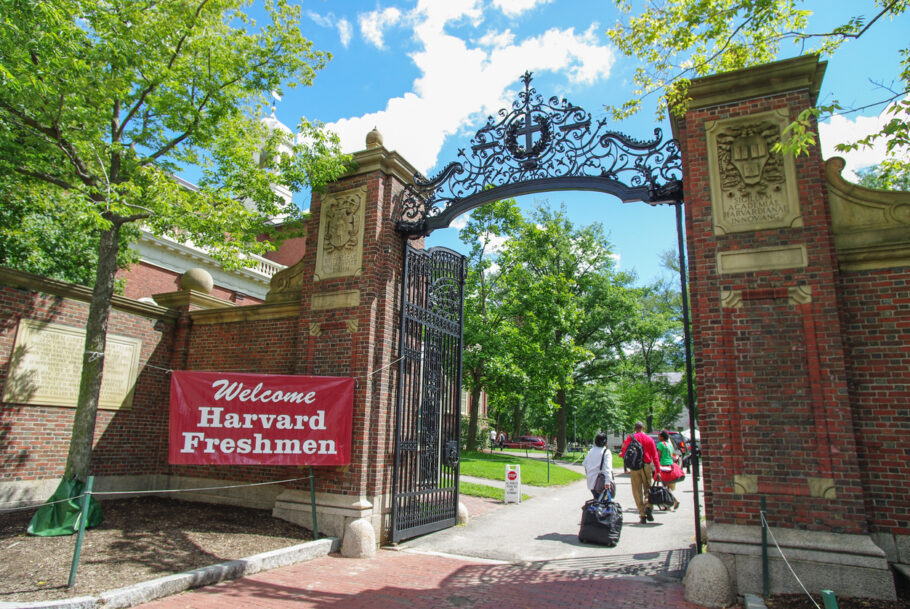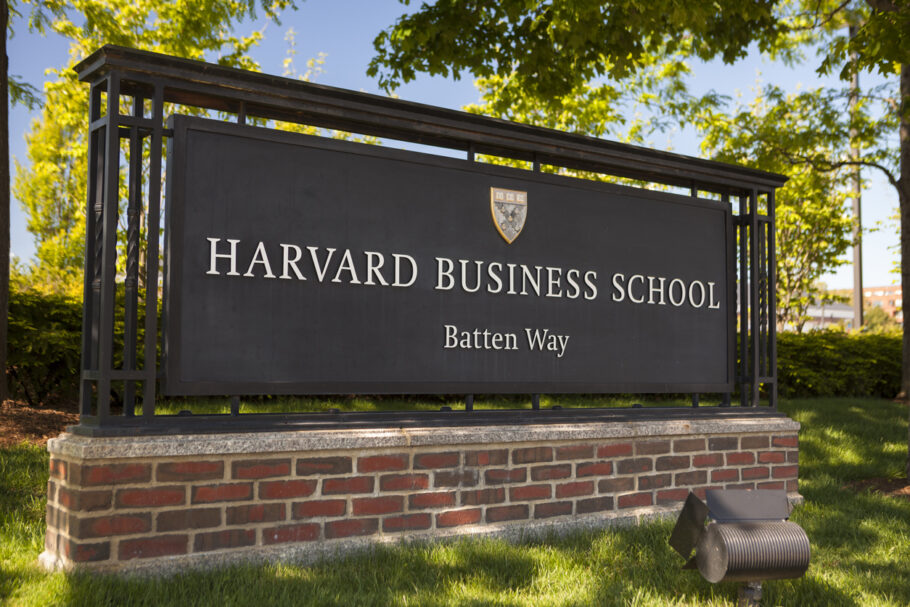Harvard disponibiliza mais de 110 cursos gratuitos online
Os cursos gratuitos são uma ótima oportunidade para dar um 'up grade' no currículo; alguns possuem legenda em português
Fundada em 1636, a Universidade de Harvard, em Cambridge, no estado de Massachusetts, (EUA), é a instituição de ensino superior é mais antiga dos Estados Unidos. Por suas salas de aula já passaram mais de 360 mil alunos, entre eles os ex-presidente norte-americanos John Kennedy, George W. Bush e Barack Obama.
Além dois prestigiados cursos de graduação, Harvard oferece uma série de cursos gratuitos e online que podem ser feitos em qualquer lugar do mudo, inclusive do Brasil.

Os cursos gratuitos oferecidos pela Universidade de Harvard são divididos em 11 áreas –Artes e Design; Negócios e Gestão; Ciência da Computação; Ciência de Dados; Ciência e Engenharia; Ciências Sociais; Desenvolvimento Educacional e Organizacional; Humanidades; Matemática e Análise de Dados; Medicina e Saúde Pública e Programação
Apesar da maioria das capacitações ser em inglês, algumas delas possuem legendas em português. Facilitando, assim, o aprendizado.
Como se inscrever nos cursos gratuitos de Harvard
Os cursos estão disponíveis na plataforma HarvardX. Os interessados podem acessar o site www.edx.org/school/ e conferir a lista com mais de 100 capacitações que podem ser realizados gratuitamente. No entanto, em algumas delas, o estudante terá que pagar uma taxa para receber o certificado de conclusão.
A maioria dos cursos é no formato “self-paced”, ou seja, eles podem ser realizados no ritmo da preferência do estudante. Contudo, alguns têm datas específicas de início e término, e exigem um acompanhamento do aluno em determinadas horas e dias.

Para se inscrever nos cursos online gratuitos da Universidade da Harvard, é necessário fazer o cadastro na plataforma HarvardX ou entrar com sua conta do Facebook, Google ou Hotmail, escolher a capacitação desejada e preenche os dados solicitados para ter acesso às aulas.
É só aproveitar a oportunidade para dar um ‘up grade’ no currículo.
Os cursos gratuitos da Universidade de Harvard
Artes e Design
- CS50’s Introduction to Game Development
- Shakespeare’s Othello: The Moor
- Shakespeare’s Hamlet: The Ghost
- Shakespeare’s Life and Work
- Shakespeare’s Merchant of Venice: Shylock
- 18th-Century Opera: Handel & Mozart
- 19th-Century Opera: Meyerbeer, Wagner, & Verdi
- Pyramids of Giza: Ancient Egyptian Art and Archaeology
- Stravinsky’s Rite of Spring: Modernism, Ballet, and Riots
- First Nights: Berlioz’s Symphonie Fantastique and Program Music in the 19th Century
- Beethoven’s 9th Symphony and the 19th Century Orchestra
- Handel’s Messiah and Baroque Oratorio
- Monteverdi’s L’Orfeo and the Birth of Opera
- The Architectural Imagination
Negócios e Gestão
- Negotiating Salary
- 4P Model for Strategic Leadership Podcasts
- The Science of Corresponding with Busy People Webinar
- Designing Organizational Structure
- Pricing Strategy
- Identifying Competitive Risk
- Understanding Customer Needs
- Investing in Private Equity
- Global News & Technology Leadership in Challenging Times
- Practical Improvement Science in Health Care: A Roadmap for Getting Results
- Webinar: Strategic Fundraising for Nonprofit Leaders
- Exercising Leadership: Foundational Principles
- Leaders of Learning
- Innovating in Health Care
- Entrepreneurship in Emerging Economies
- Improving Your Business Through a Culture of Health
- Contract Law: From Trust to Promise to Contract
- Contract Law: From Trust to Promise to Contract
Ciência da Computação
- CS50’s Introduction to Game Development
- CS50: Introduction to Computer Science
- CS50’s Introduction to Programming with Scratch
- Quantitative Methods for Biology
- Data Science: Machine Learning
Ciência de Dados
- Causal Diagrams: Draw Your Assumptions Before Your Conclusions
- Case Studies in Functional Genomics
- Advanced Bioconductor
- Introduction to Bioconductor
- High-Dimensional Data Analysis
- Statistical Inference and Modeling for High-throughput Experiments
- Introduction to Linear Models and Matrix Algebra
- Statistics and R
- Quantitative Methods for Biology
- Principles, Statistical and Computational Tools for Reproducible Data Science
- Data Science: R Basics
- Data Science: Visualization
- Data Science: Probability
- Data Science: Inference and Modeling
- Data Science: Productivity Tools
- Data Science: Machine Learning
- Data Science: Capstone
- Data Science: R Basics
- Data Science: Visualization
Ciência e Engenharia
- Cell Biology: Mitochondria
- Fundamentals of Neuroscience, Part 2: Neurons and Networks
- Bioethics: The Law, Medicine, and Ethics of Reproductive Technologies and Genetics
- Fundamentals of Neuroscience, Part 1: The Electrical Properties of the Neuron
- Fundamentals of Neuroscience, Part 3: The Brain
- Backyard Meteorology: The Science of Weather
- Human Anatomy: Musculoskeletal Cases
- Case Studies in Functional Genomics
- Advanced Bioconductor
- Introduction to Bioconductor
- High-Dimensional Data Analysis
- Statistical Inference and Modeling for High-throughput Experiments
- Introduction to Linear Models and Matrix Algebra
- Statistics and R
- The Einstein Revolution
- The Einstein Revolution
- MalariaX: Defeating Malaria from the Genes to the Globe
- Quantitative Methods for Biology
- Improving Your Business Through a Culture of Health
- MicroBachelors® Program in University Chemistry
- Energy and Thermodynamics
- Entropy and Equilibria
- Electrochemistry
- Energy to Electrochemistry Final Exam
- Principles of Biochemistry
- Super-Earths and Life
Ciências Sociais
- PredictionX: Omens, Oracles & Prophecies
- Systematic Approaches to Policy Design
- New Ideas for Nonprofit Leaders Webinar
- 4P Model for Strategic Leadership Podcasts
- The Science of Corresponding with Busy People Webinar
- Global News & Technology Leadership in Challenging Times
- Our Information Emergency: Navigating the Media Environment in 2021
- Crisis Management: Adaptive Recovery, Resiliency, and Moving Forward Webinar
- Global Feminism in the 21st Century Webinar
- Webinar: Supply Chain Management: Failures and Success in a COVID-19 World
- Webinar: Managing COVID-19 in the Americas, Africa, and the Middle East
- Webinar: Harnessing Power for Positive Impact
- Webinar: Strategic Fundraising for Nonprofit Leaders
- United States Health Policy
- Bioethics: The Law, Medicine, and Ethics of Reproductive Technologies and Genetics
- The Path to Happiness: What Chinese Philosophy Teaches Us about the Good Life
- American Government: Constitutional Foundations
- U.S. Political Institutions: Congress, Presidency, Courts, and Bureaucracy
- Citizen Politics in America: Public Opinion, Elections, Interest Groups, and the Media
- U.S. Public Policy: Social, Economic, and Foreign Policies
- Pyramids of Giza: Ancient Egyptian Art and Archaeology
- CitiesX: The Past, Present and Future of Urban Life
- Contract Law: From Trust to Promise to Contract
- Early Childhood Development: Global Strategies for Interventions
- We the People: Civic Engagement in a Constitutional Democracy
- Contract Law: From Trust to Promise to Contract
Desenvolvimento Educacional e Organizacional
- Introduction to Data Wise: A Collaborative Process to Improve Learning & Teaching
- Leaders of Learning
- Introduction to Family Engagement in Education
- Early Childhood Development: Global Strategies for Interventions
Humanidades
- PredictionX: Lost Without Longitude
- PredictionX: John Snow and the Cholera Epidemic of 1854
- PredictionX: Omens, Oracles & Prophecies
- Women Making History: Ten Objects, Many Stories
- Modern Masterpieces of World Literature
- Ancient Masterpieces of World Literature
- Masterpieces of World Literature
- Shakespeare’s Othello: The Moor
- Shakespeare’s Merchant of Venice: Shylock
- Shakespeare’s Life and Work
- Shakespeare’s Hamlet: The Ghost
- 18th-Century Opera: Handel & Mozart
- 19th-Century Opera: Meyerbeer, Wagner, & Verdi
- Bioethics: The Law, Medicine, and Ethics of Reproductive Technologies and Genetics
- Rhetoric: The Art of Persuasive Writing and Public Speaking
- The Path to Happiness: What Chinese Philosophy Teaches Us about the Good Life
- American Government: Constitutional Foundations
- Citizen Politics in America: Public Opinion, Elections, Interest Groups, and the Media
- The Einstein Revolution
- The Einstein Revolution 2
- Pyramids of Giza: Ancient Egyptian Art and Archaeology
- Christianity Through Its Scriptures
- Handel’s Messiah and Baroque Oratorio
- Monteverdi’s L’Orfeo and the Birth of Opera
- Stravinsky’s Rite of Spring: Modernism, Ballet, and Riots
- First Nights: Berlioz’s Symphonie Fantastique and Program Music in the 19th Century
- Beethoven’s 9th Symphony and the 19th Century Orchestra
- CitiesX: The Past, Present and Future of Urban Life
- ChinaX Book Club: Five Authors, Five Books, Five Views of China
- Global Health Case Studies from a Biosocial Perspective
- We the People: Civic Engagement in a Constitutional Democracy
Matemática e Análise de Dados
- Causal Diagrams: Draw Your Assumptions Before Your Conclusions
- High-Dimensional Data Analysis
- Statistical Inference and Modeling for High-throughput Experiments
- Introduction to Linear Models and Matrix Algebra
- Introduction to Probability (on edX)
- Statistics and R
- Case Studies in Functional Genomics
- Advanced Bioconductor
- Introduction to Bioconductor
- Calculus Applied!
- Principles, Statistical and Computational Tools for Reproducible Data Science
- Fat Chance: Probability from the Ground Up
- Data Science: Probability
- Data Science: Inference and Modeling
- Data Science: Capstone
- Data Science: Inference and Modeling
- Data Science: Capstone
Medicina e Saúde Pública
- PredictionX: John Snow and the Cholera Epidemic of 1854
- Strengthening Community Health Worker Programs
- Practical Improvement Science in Health Care: A Roadmap for Getting Results
- Fundamentals of Neuroscience, Part 1: The Electrical Properties of the Neuron
- Fundamentals of Neuroscience, Part 3: The Brain
- Humanitarian Response to Conflict and Disaster
- Bioethics: The Law, Medicine, and Ethics of Reproductive Technologies and Genetics
- United States Health Policy
- Fundamentals of Neuroscience, Part 2: Neurons and Networks
- The Path to Happiness: What Chinese Philosophy Teaches Us about the Good Life
- Human Anatomy: Musculoskeletal Cases
- The Opioid Crisis in America
- MalariaX: Defeating Malaria from the Genes to the Globe
- Innovating in Health Care
- Entrepreneurship in Emerging Economies
- Improving Your Business Through a Culture of Health
- Global Health Case Studies from a Biosocial Perspective
- Principles of Biochemistry
- Early Childhood Development: Global Strategies for Interventions
- Community-Engaged Research
Programação
- CS50’s Introduction to Game Development
- CS50: Introduction to Computer Science
- CS50’s Introduction to Programming with Scratch
- Quantitative Methods for Biology